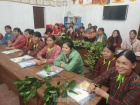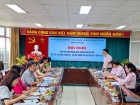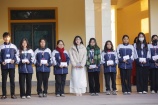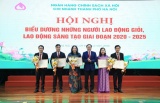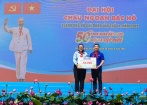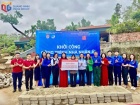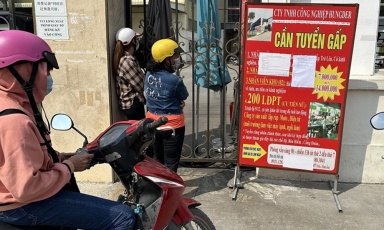Policy event on gender equality on occasion of International Women’s Day 2017 in Hanoi
(LĐXH) In March 3rd, on occasion of International Women’s Day 2017, the Ministry of Labor- Invalids and Social Affairs (MOLISA) cooperated with the United Nations in Viet Nam to hold a policy discussion on gender equality with the theme "Empowering economic rights for women in the changing world of employment” in Hanoi.
The workshop was chaired by Minister of MOLISA Dao Ngoc Dung, Deputy Minister of MOLISA Nguyen Trong Dam, Ms. Shoko Ishikawa, Representative of UN Women in Viet Nam, Mr. Kamal. Malhotra, United Nations Resident Coordinator in Viet Nam. Attending the workshop was nearly 100 delegates, leaders of other ministries, ambassadors from member countries of the United Nations, socio-political organizations, UN agencies and donors in Vietnam.

Minister Dao Ngoc Dung had an opening speech at the workshop
Speaking at the opening of the workshop, Minister Dao Ngoc Dung said that there was 53.27 million employed people nationwide, of which 48.48% was employed women. In 2016, 1.641 millions employees have jobs, of which 48% was women. Viet Nam has 73% female labor force contributing to the economy, while the latter is only 65.5% in Southeast Asia. With the development of export industries, the proportion of female workers in the manufacturing sector is much higher than that of male worker. The proportion of paid female workers with insurance is higher than that for men in the private sector.
However, the majority of female workers in industrial zones (textiles, garments, footwear, etc.) have low professional qualifications (accounting for 70% of total employment in these sectors). The proportion of female workers in the informal sector is high: 62.4% of female workers work unpaid or self-employed; 41.1% of female workers do simple jobs; 43.6% of female employees work in agriculture. The average monthly wage of female workers is about 4.58 million dong, lower than that of male labor which is 5.19 million dong.

Ms. Andrea Prince, SME expert presented on Trends, Challenges and Recommendations for the implementation of gender equality in Vietnam
In addition, the advances in science and technology in industries with the replacement of machines in production lines reduce the need for human resources, increase the demand for labor skills. It also has a negative impact on the employment opportunities and the stability of the employment of female workers. Old prejudices and disdains underestimating the ability of women in the workplace also lead to many difficulties for women to assert their place in society.
Mr. Kamal Malhotra, United Nations Resident Coordinator in Viet Nam emphasized: "Empowering women in the workplace and ensuring the rights of women in the workplace have a vital role to perform "Beijing Action Platform”, the 2030 Agenda for Sustainable Development and the Convention on the Elimination of All Forms of Discrimination Against Women in CEDAW which Vietnam has pledged to implement."
During the discussion, participants talked about current trends, challenges and made recommendations for implementing gender equality and empowering women in Viet Nam in the context of changing world on employment, towards achieving the specific objectives of the 2030 Agenda (SDGs) on economic empowerment, decent work and gender equality.

Minister Dao Ngoc Dung takes pictures with the representatives from UN organizations and embassies in Vietnam
At the end of the talks, the leaders of MOLISA and the United Nations pledged to continue working closely with relevant agencies and organizations in Vietnam to promote gender equality and economic empowerment of women in Viet Nam. They also proposed to the participants in the discussion towards the goal not to leave women behind in the development process.
Written and translated into English by Minh Ngoc
TAG:

